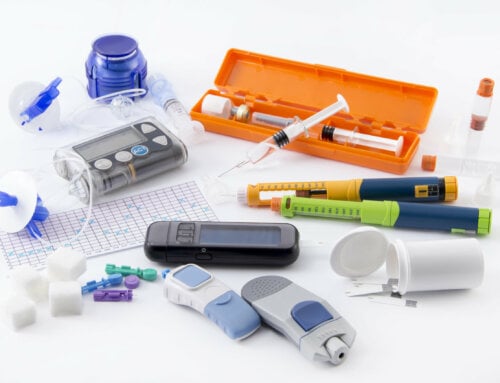This week, during diabetes education management sessions, I addressed some important topics concerning a patient which I think will be of interest to you. The first patient of the day was a 43-year old woman who presented with a 15-year history of diabetes type 2. She stated that she weighed 140 lbs (5’4″) at age 23 prior to trying to become pregnant. After 3 miscarriages she was placed on Progesterone, a hormone which would increase the likelihood of her carrying the baby to full term. The problem is she was placed on this hormone for her next 2 babies as well and ended up weighing over 250 pounds after her 3 children were finally born. We discussed that some of the tremendous weight gain was certainly related to the hormone medication needed to hold the pregnancies, but much of it was due to her stress during that time period and her poor eating habits. She admitted that she spent years ‘escaping to food’ to relieve her frustrations and disappointments. After each child’s delivery, she held on to a large amount of weight and started a new diet program ranging from “The Grapefruit Diet” to “The Cookie Diet”. These were followed by HCG shots, diet pills and pre-packaged meal plans. She lost 20-30 lbs with each diet attempt and ended up weighing approximately 240 when she returned to her ‘normal eating’ pattern. Her other big concern was that she was always ‘catching everything that was floating around the house’ from her family and that she would remain sick longer than anyone else. She noted that her immune system was failing, the more her blood sugars were out of control. After years of personal despair and the beginnings of diabetes complications including neuropathy, she finally made a decision to learn about diabetes self management. We reviewed the concepts of balanced eating, medication, exercise and other critical lifestyle skills. She also decided that mental health counseling with a professional would help complete her desire for more effective and long term change.
Here is some of the basic information we discussed:
- Forget about all the diet programs once and for all and start on a healthy, livable and realistic plan that you will be able to follow for life. We discussed using the “Plate Method” of eating since she was not interested in weighing or measuring her food. I recommended a portion plate or specially designed containers that have distinct sections to fill with different types of foods.
- 1/2 the plate with non-starchy vegetables which are considered ‘free food’. She enjoyed crunchy foods so this might help fill her desire for chips. According to the latest USDA guidelines, women should eat 7 servings of vegetables and fruits daily. With diabetes, fruit portions need to be reduced but not eliminated since they are carbohydrates and will turn into sugar. We reviewed how fiber would not only help her feel more satiated but it would also help with blood sugar control. She was not a vegetable eater so we explored options. We talked about using lettuce leaves or collard greens in place of bagels or doughy French bread for sandwich options. Adding vegetables including lettuce, tomato, onions, olive slices and avocado would bulk up a sandwich as well. We talked about shredding carrots, celery and onions and adding to casseroles and sauces to bulk up a meal. Purchasing pre- cut vegetables, although more expensive, was the way to go since she had so much going on during meal time.
- 1/4 of the plate would be for complex carbohydrates including whole grains, starchy vegetables including corn, peas, beans and potatoes or fruit. She mentioned that she had already eliminated white starchy foods and was happy replacing them with whole grains that offer more fiber.
- 1/4 of the plate should be lean protein including fish, shellfish, poultry, lamb, lean beef or pork. She could substitute beans, nuts, tofu or legumes as the protein source. She could include low fat dairy products including cheese, yogurt or milk for calcium content and limit to 2-3 cups daily.
- Try to delete fat –free dairy products which may have added sugars and artificial flavors. Avoid trans-fats and simple sugars and limit sodium and saturated fats. Try to include a large variety of foods which will give you plenty of vitamins and nutrients and hopefully prevent boredom. Watch cooking preparation and limit oil when cooking. Substitute vegetable or chicken broth when sautéing. Mash up an avocado to use as a spread instead of butter or mayonnaise. Bake kale chips in the oven with a teaspoon of olive oil for healthy crunch. Do not deprive yourself of a treat if you are craving one, since it could backfire. Consider mixing 5-10 dark chocolate chips with a handful of unsalted nuts for a perfect snack. Dark chocolate with 70 % cocoa has been shown to have many health benefits. It may help reduce the risk of blood clots, lower blood pressure, improve vascular function, decrease insulin resistance and increase endorphin or happy hormone release. Dark chocolate contains potassium and copper. Drink liquids with zero calories except for low-fat milk which counts as a carbohydrate.
- We then discussed why her immune system may be depressed. I explained how white blood cells, which help fight infection, are compromised when blood sugars are elevated. Other tips offered to boost immunity were to avoid smoking since the mouth and nose are the first line of defense affected by smoking. More immune bashers are lack of sleep or poor sleep quality which can increase fatty acids and inhibit insulin ability. Sleep loss also increases cortisol levels which can raise blood sugars. Drinking alcohol can irritate the lining of the mouth and esophagus and allow viruses to enter the body easier. Drinking excess alcohol, more than 2 drinks per day, was associated with a decreased immune system and an increase of liver cancer. Stress, irritation and too much pressure will compromise the immune system. Sugar and processed foods are not only harmful for diabetes, but reduce the function of the immune system. Lack of exercise, depression that is not addressed, and avoiding proper age appropriate vaccines will lessen a strong immune system. The easiest immune booster is good hand washing and getting plenty of fresh air even in the winter months.
After our discussion she knew she had to make quite a few changes to work on improved diabetes control and good overall health, but she was excited to have a plan. She realizes that if all the lifestyle changes do not achieve better numbers, then her medication will become part of the equation as well. We will meet again in a month to monitor her progress. She stated that she was ready to feel stronger and forge ahead so she could play with her grandchildren, this time with more energy and ability to get down on the floor to play. You can do it too!
NOTE: Consult your Doctor first to make sure my recommendations fit your special health needs.







Leave A Comment